Towing strikes a sense of fear in many, uncertainty in some, and a disregard for critical criteria by others. To put it simply: It’s because most people don’t understand the guidelines and verbiage associated with towing a trailer. And to be honest, it can be confusing! So, ultimately what ends up happening? Folks just hook up a trailer, load their belongings and supplies as they see fit, and ignore the importance of many details.
My main objective here is NOT to confuse you with technical terms and complicated formulas.
Basics
When hitching a trailer to the back of any tow-vehicle, you have now increased the overall weight that you are moving down the road. Make sure your designated tow-vehicle is capable of handling what you are wanting to tow. You can check your owner’s manual to find the maximum towing capacity, or check with a dealership of your vehicle’s make.
You also don’t want to ignore your vehicle’s Gross Weight Rating. This is the total weight of your vehicle after adding you, your passengers, dog, fuel, and anything else you plan on carrying.
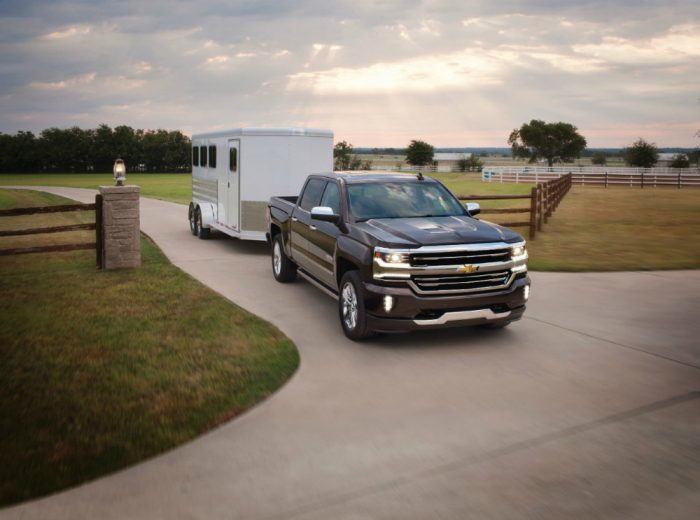
Does your vehicle have a factory installed hitch? Check the rating to see if it is capable of carrying your trailer. Photo: Chevrolet
Getting Hitched
Conventional hitches, which are mounted under the back of the vehicle, can vary. Class I, II, III, IV, and V ratings – increasing with capability as the number goes up. This now requires knowing the weight of your trailer. There is an empty, or Curb Weight, which is the dry weight of the trailer. Thecurb weight is before filling water tanks, adding kitchen supplies, clothes, bedding, bicycles, and other cargo into a travel trailer. In the case of a boat and trailer, this is before adding gas, skis, life jackets, ice chest, beverages, and the actual ice.
You will be amazed at how rapidly these items add up in weight! If your maximum towing capability is 5,000 pounds, and your trailer’s curb weight is 4,800 pounds – you can only add 200 pounds to your trailer. It doesn’t take much to go over that 200 pounds!
Tongue Weight
The trailer weight also needs to be balanced so that you are placing 10-15% of the total weight of the trailer onto the hitch of your vehicle. This is called Tongue Weight and it is an important number. Too much tongue weight may cause the back of the vehicle to sag or squat. This is hard on suspension and drive lines, and may take away the critical front tire contact-patch on the road, leaving you with unsafe steering. On the other hand, too little tongue weight can cause the trailer to sway uncontrollably, as it lifts the back of your vehicle.
The next time you’re on the road, look closely at the vehicles with a trailer. You will be amazed at the number that sag in the rear.
Braking
One of the most important safety issues when towing the extra weight of a trailer is stopping distance. Depending on the weight of the trailer, it may more than double your stopping distance. Most trailers today have electric brakes behind their wheels, just as on your vehicle. An electric current applies the trailer’s brakes as you apply your vehicle’s brakes. Boat trailers tend to have Surge Brakes. As the weight of the boat and trailer move forward under braking, this process activates the surge unit located on the Coupler of the trailer’s tongue, forcing brake fluid to the trailer’s brakes, causing brake activation.
For travel trailers, utility trailers, box trailers, and others, you should have a Trailer Brake Controller installed inside your vehicle. This device will give you added braking ability by being able to control the amount of braking at the trailer, without the trailer’s brakes locking while slowing or stopping. You can adjust the brake controller for heavier trailers, which will require more braking.
This process takes a load off your vehicle’s brakes. This is extremely helpful in the case of downhill grades, as the trailer’s weight “pushes” your vehicle, ultimately reducing brake fade.
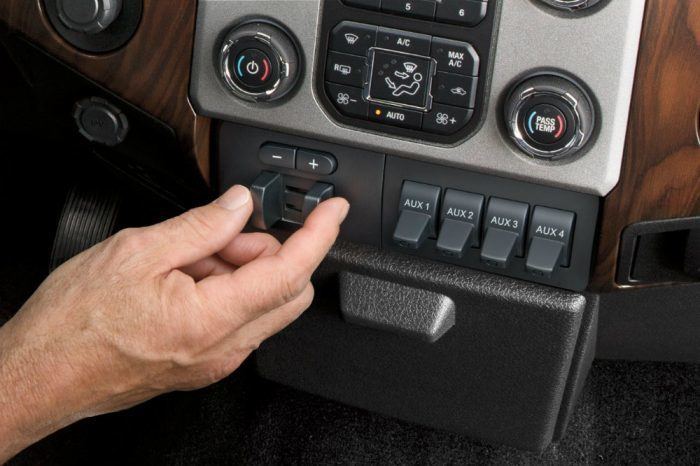
Many of today’s trucks feature integrated trailer brakes from the factory but there are aftermarket systems available. Photo: Ford Motor Company
Towing Heavy
As you move into larger trailers, they may be built on a platform known as a 5th Wheel or Gooseneck. These are the types of trailers you see attached to hitches inside the bed of a truck. They allow for increased weights to be towed, as well as a more stable towing platform, as the trailer’s weight is mounted further over the truck’s frame, distributing the weight more evenly.
However, there is a difference between a 5th Wheel and a Gooseneck hitch. A 5th Wheel hitch is commonly found on travel trailers, where as a Gooseneck is found on horse trailers and flatbed utility trailers. The connections are also different in these two hitches. A 5th Wheel trailer attaches to a flat plate mounted in the bed of the truck by what is called a King Pin. Whereas a Gooseneck attaches to a ball in the bed of the truck, similar to the ball mount on the back of a conventional hitch.
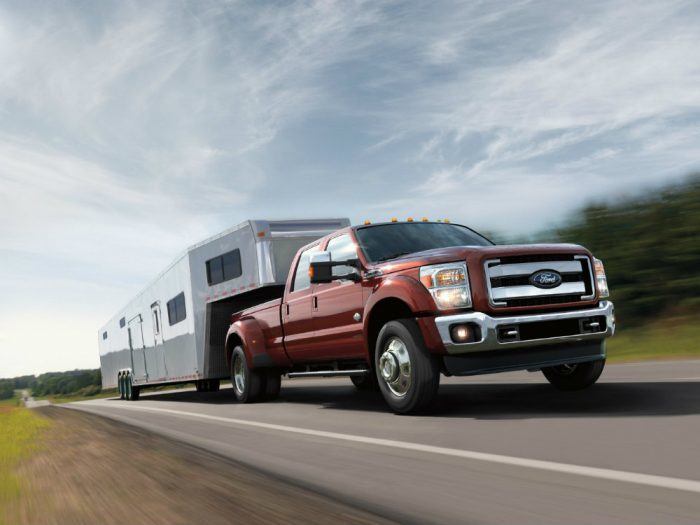
5th Wheel and Gooseneck trailers have a distinct maneuvering advantage over a conventional hitch, making for tighter turns, both going forward and during backing, without jackknifing. Photo: Ford Motor Company
Final Essential Tips
You are about to embark on vacation, an adventure, or memory making trip – it should be fun and stress free! I began trailering when I was ten years old. Was I fearful? You bet! However, through some words of wisdom back then, and throughout my many decades of trailering, I truly enjoy the frequency of having a trailer hitched to my truck.
After all these years, I still follow these tips:
- Make sure you conduct a thorough walk around of your vehicle and trailer before you get on the road. I am extremely safety conscious, and check connections, chains, and lighting – twice before driving away. This ensures I have not overlooked anything on the first check, and will give you peace of mind as you drive.
- Leave yourself a greater distance with a trailer than without. Watch well ahead in traffic for brake lights. If brake lights are visible ahead, better to slow down sooner than later to avoid unsafe braking at highway speeds.
- Most of all slow down! And, I don’t just mean your driving speed. When you have a trailer hitched to your vehicle, make sure that every action you take, and movement you make, is done with a specific intention. Whether it is the safety check, merging into traffic, or backing your trailer, do everything slow and deliberate.
With towing, there is no need to rush and make it more complicated. It may seem to take longer at a slower pace, but in reality, you will save time by not trying the same maneuver multiple times. Or, worse yet, causing damage to your trailer or truck! Never let your guard down and keep a keen awareness of your surroundings.
Do that and you will enjoy any trailering experience.
from Automoblog.net http://www.automoblog.net/2016/06/03/trailer-towing-essential-tips-safety-peace-mind/
via IFTTT
from Tumblr http://peternpalmer.tumblr.com/post/145359710501
via IFTTT
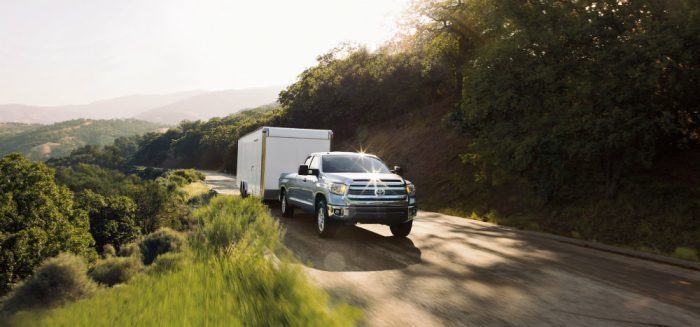
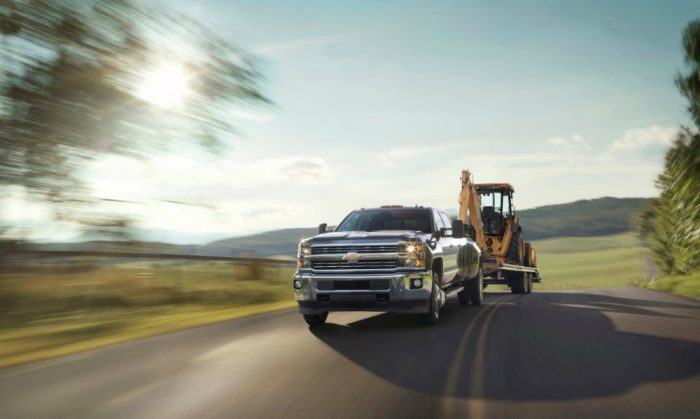
No comments:
Post a Comment